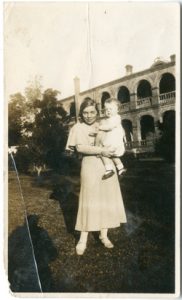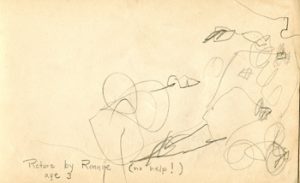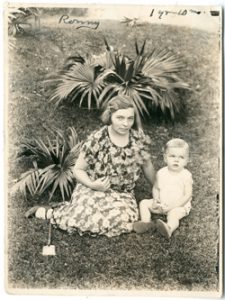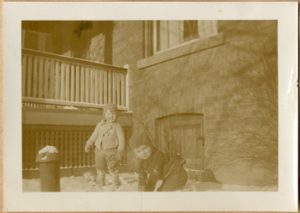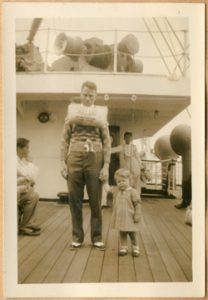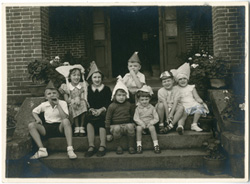What was life like for a missionary family in Taiwan? For the most part, the Dickson family experienced many of the same challenges and fun times as any North American family at that time. The linguistic and social isolation could be difficult, however, and Lillian would seize opportunities to socialize with other Westerners where possible:
Yesterday, Jim was home & the day was warm & sunny so there was no danger of Marilyn taking cold, so I deliberately took a day off & went calling. I called at four places. […] In spite of the friendliness & naturalness of our Chinese friends, I often hunger for more white faces and the English language, and it is a relief to meet other than missionaries as a change, one man loaned me a dozen or so Edgar Wallace detective stories- I enjoy them.
(1997-5006-3-3; letter dated December 10, 1933)
As Ronald and Marilyn grew older, the interactions with their parents became more interesting, complex, and humourous, often reflecting the nature of their unique missionary life and the socially complex surroundings. Lillian, even as the parent, often did not know how to explain some larger concepts when the children had yet to experience life outside of Taiwan:
Ronald makes such funny deductions in trying to understand our explanations, and he is all questions. How in the world will I ever explain America to him. He had one little friend who returned to England, and then the question was ‘Where is England?’ Then last Sunday a young couple with a little girl who spent a couple of days with us returned to China, […] but Ronald wanted to know where Agnes had gone, and when I saw China, then the next question is ‘Where is China?’ and ‘Where is America?’ and how can one explain geography to a three-year old child!
(1997-5006-3-3; letter dated February 27, 1934)
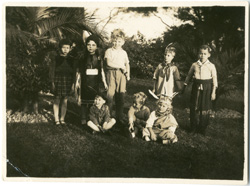
When the family finally did go on furlough to North America, and the children could grasp a sense of geography through their travels, new trials in parenthood were experienced.
The quintessential “Are we there yet?” that most North American families are all too familiar with, took on a new meaning while the Dicksons travelled from North America to Japan by ship and train:
My little girl’s ever-insistent question for many days had been, ‘What do we go, go, go for? I want to stop. Where is our home, mother?’ and it had been getting on my nerves. I, too, wanted a home, and wanted to stop. So when we reached Tokyo, we were really at the end of the journey, but we had not yet found a home. The next day we went house-hunting and were very fortunate in being able to rent a Mission house on a Compound, […] It was completely furnished too,-the missionaries who ordinarily live here are home on furlough,-and so we walked in, unpacked our clothes, and were at last–at home!
(1997-5006-1-2; letter dated October 28, 1935)
Of course, when the children grew older, they had other typical childhood antics and performances of their own that would become stories for Lillian to recall:
There was a Sunday School Xmas program in the Tamsui Church & they [the organizers] begged me to let my two be on it. When their number came (they had practised before with the others) they got up on the platform,-Marilyn was a little bewildered at so many people & was looking around while Ronny made his bow. She forgot to make any, so he gave her a nudge. She didn’t know what the nudge was for but she’ll not take anything from him anywhere, so she just gave him a good push back. Then he pushed her & she pushed him again,–imagine my aghast on the sidelines looking on while my cherubs were in the spotlight,–fighting – instead of singing ‘Jesus Loves Me’!! But then they got together and sang Jesus Loves Me – later on another number Little Hands to Work for Jesus without any additional catastrophe. The audience, of course, was convulsed,–they had become quite accidentally the most interesting number on the program.
(1997-5006-3-3; letter dated January 11, 1937)
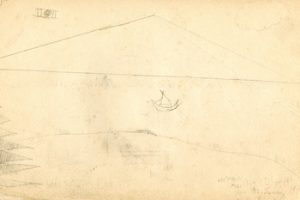
Lillian often noted that the number of languages in use in Taiwan, particularly among missionaries, proved to be one of the greater challenges in the Dickson household: “Tonight Sister [Marilyn] was pretending to read a story to me, and she said, ‘Now shall I read it to you in Japanese, Formosan or American?’ Imagine a four-year old having to deal in three languages as we have to here.” (1997-5006-3-3; letter dated April 16, 1937) Perhaps though, the children managed the languages quite well and the difficulties lay most with Lillian due to her work as a missionary and the constant switching between the three languages:
This working in three languages every day is enough to drive one ‘nutty’. All educated people prefer to use Japanese as that is the language of quality, so at Marilyn’s kindergarten and Sunday School and among our students we use Japanese. […] To the children and Jim I use English, but sometimes when I am very tired I get mixed up and begin talking to them in Formosan to their great amusement.
(1997-5006-3-3; letter dated May 20, 1938)
As time passed, the family adjusted and eventually both Ronald and Marilyn attended school in the United States. When Lillian returned to the U.S. on furlough, she describes the anxiety of a missionary mother who has not seen her children in several years: “And to meet the children, now grown tall and mature and competent while you have been away! I think every missionary mother goes home with love and trepidation. Will the children mind that you are different from conventional mothers, that God has given you queer hard things to do?” (1997-5006-2-2; circular letter dated August 20, 1953)
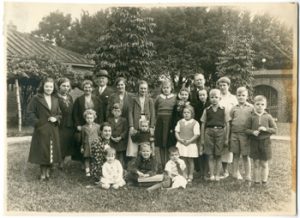
More than thirty years later, Marilyn is married to Vernon Tank and they are raising their own children in Taiwan. The world has already changed considerably, and while both families experienced the process of ordering from Sears via catalogue, Lillian is confused by what many North Americans now recognize as the Sear’s Wish Book catalogue: “On Tanks’ desk there are two catalogs,-one is Sears Roseback [sic], and one is called a ‘Wish Catalog’ which seems also to be Sears.” (1997-5006-3-3; letter to Marilyn dated November 27, 1980)
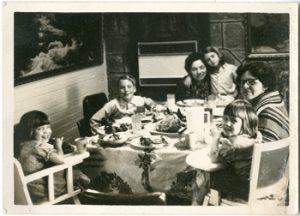
Around this time Marilyn and her growing family have taken over many of The Mustard Seed duties, including speaking tours to the United States, as Lillian becomes less inclined to long journeys. Lillian helps Marilyn decide where to speak and provides various tips. Upon seeing the Canadian speaking tour schedule, Lillian writes to Marilyn, “I see you are going to have a busy time in Canada, but I know it will be a happy time,-the Canadians are lovely people.” (1997-5006-3-3; letter to Marilyn dated April 14, 1981)
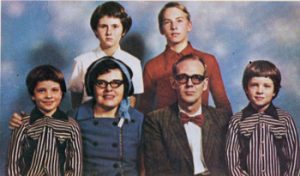
This Project has been made possible [in part] by the Government of Canada through the Young Canada Works and Heritage Organizations Program. « Ce projet a été rendu possible [en partie] grâce au gouvernement du Canada par de Jeunesse Canada au travail et le Programme des organismes patrimoniaux». This exhibit was created by the Archives summer intern, Victoria Baranow.
*Copyright 2012 – The Presbyterian Church in Canada
If you wish to quote or use any part of this website exhibit, please give credit to The Presbyterian Church in Canada Archives.
